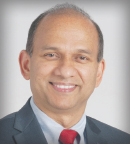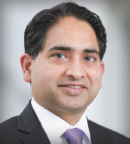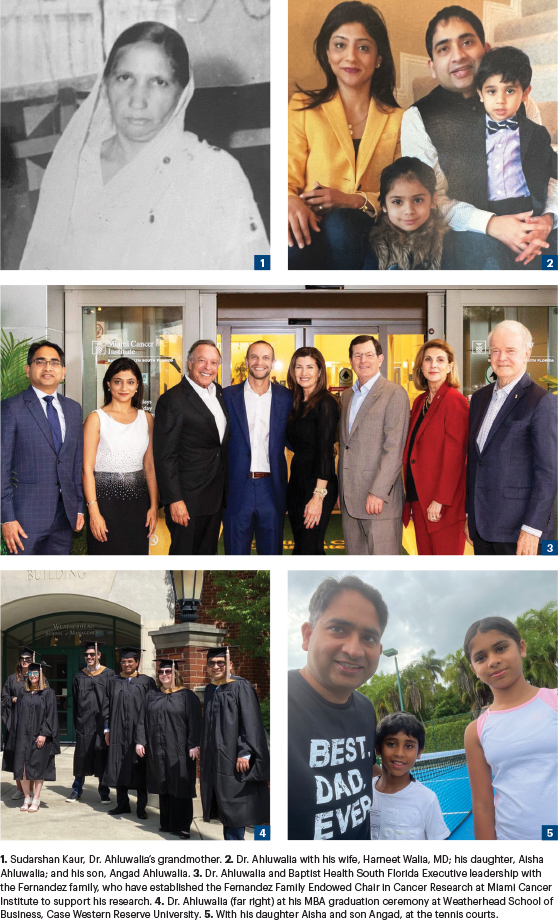In this installment of Living a Full Life, Guest Editor Jame Abraham, MD, spoke with Manmeet S. Ahluwalia, MD, MBA, Deputy Director, Chief Scientific Officer, and Chief of Solid Tumor Medical Oncology at Miami Cancer Institute, where his research focuses on the development of new therapies for patients with brain tumors and brain metastases.
Guest Editor

Jame Abraham, MD, FACP
Dr. Abraham is Chairman of the Department of Hematology and Medical Oncology at Cleveland Clinic and Professor of Medicine at Lerner College of Medicine.
Dr. Ahluwalia was born in Meerut, a small town outside New Delhi, the capital of India. However, given the transportation challenges to reach school each morning, Dr. Ahluwalia’s parents wisely decided it would make more sense for him to live with his beloved grandmother, who resided in New Delhi.
“It used to take me more than 2 hours to reach school. I used to wake up at 4:10 AM and bicycle for a mile and a half to catch the first water truck, which would then take me almost five miles before I could get the public road transport on the outskirts of the city. And then I would take two buses to reach the school by the 7:00 AM opening bell. So, that’s why I started living with grandmother, who became my primary caregiver. Unfortunately, she was diagnosed with cervical cancer and later died of the disease. As a naive 12-year-old, I thought I would go to the United States, do research, and cure cancer. Now, I am humbled and inspired by my patients every day,” he shared.
Dr. Ahluwalia continued: “I ended up going to Maulana Azad Medical College, which is one of the renowned medical schools in India. It has a rich track record of physicians who’ve done well in India, but also many went abroad to the United States, United Kingdom, or Canada to pursue further training.”
According to Dr. Ahluwalia, he ruled out a surgical career early in medical school, gravitating toward medicine and research. “To me, the premise of research is you can impact the life of someone you’ll never see. As a physician, we see patients every day and are so lucky we can touch someone’s life and truly make a difference. But if you’re involved in say drug development, leading to a cure or substantial improvement in outcomes, you affect populations, not just the individual patient with cancer. So, for me, the premise of research was always transformative in nature, and the possibilities that can arise in clinical research are endless, which is incredibly exciting.”
Emigrating to Canada
In 2001, after earning his medical degree from Maulana Azad Medical College, Dr. Ahluwalia’s family emigrated to Toronto. “I was taking my U.S. medical licensing exams while I was in Toronto and had the privilege of working at the University of Toronto with Dr. Jagdish Butany, who was a world-renowned expert in heart valves and cardiac tumors. That’s also where I did my postdoc work and learned most of my research techniques. It was an extremely enriching experience for me as a person, and it shaped my research endeavors, philosophies, and methodologies, which really transformed the rest of my life,” he explained.
MANMEET S. AHLUWALIA, MD, MBA

- On why he gravitated to clinical research: “To me, the premise of research is you can impact the life of someone you’ll never see. The possibilities that can arise in clinical research are endless, which is incredibly exciting.”
- On working at the University of Toronto: “It was an extremely enriching experience for me as a person, and it shaped my research endeavors, philosophies, and methodologies, which really transformed the rest of my life.”
- On leaving the Cleveland Clinic: “Frankly, leaving the Cleveland Clinic was the most difficult decision of my professional life. However, it was the promise of building a big cancer program in South Florida that drew me here.”
Dr. Ahluwalia added: “Dr. Butany was the Vice Chair of Pathology and Laboratory Medicine at the University of Toronto. He was also a graduate of All India Institute of Medical Sciences and had come to Canada to work as a pathologist. But prior to coming there, he was a surgeon in India. He had a very aggressive approach to life, and we had a productive period there together. I was there for about 15 months, and we were able to publish 16 papers in that fairly short period. I think the best thing I learned about research was the ability to interact with so many individuals, which included people from the basic science laboratories to clinicians.”
Taking a Mentor’s Advice
During his experience at the University of Toronto, Dr. Ahluwalia was offered a residency in medicine at Cleveland Clinic’s Fairview Hospital. “Dr. Butany excitedly told me to jump on that prematch because he had the highest respect for the Cleveland Clinic,” remembered Dr. Ahluwalia. “I took his advice and did my residency at Fairview Hospital, where I was lucky to work very closely with Dr. Hamed Daw and then with Dr. David Peereboom and Dr. Tom Budd.”
During his residency, Dr. Ahluwalia became acquainted with Dr. Derek Raghavan, who at that time was Director of the Cleveland Clinic Cancer Center. “Derek suggested I think about doing brain tumors,” he continued. “However, I told him no because I was fascinated with multiple myeloma. At that time, I was working with Dr. Mohammad Hussain, who was a world-leading researcher in multiple myeloma. As a young resident, I was enamored by multiple myeloma, but as life would have it, I ended up doing brain tumors. Derek Raghavan suggested I do a fellowship program at Roswell Park Cancer Institute, because he had been a chairman there and thought it would be a nice complement to my training at the Cleveland Clinic.”
In 2006, Dr. Ahluwalia began his oncology fellowship at Roswell Park Cancer Institute, which he described as a robust and fruitful period in his career development. “I was very lucky at Roswell Park because I had numerous people who were extremely giving: Dr. Skip Trump, who was Director of the cancer center at that time; Dr. Candace Johnson, who is Roswell’s current Director of the cancer center; Dr. Ellis Levine, and Dr. Zale Bernstein, my two program directors, who were profoundly supportive of my academic endeavors. In my second year of fellowship, I met with the Cleveland Clinic group and decided I would join them on the completion of my fellowship. During my third year, as a medical oncology fellow, I did two clinics in neuro-oncology; as you may know, 95% of neuro-oncologists are neurology-based. There are very few people in medical oncology who end up doing brain tumors. I was lucky, David Peereboom was one of them,” he revealed.
Building a Culture
In 2009, following his fellowship, Dr. Ahluwalia joined Cleveland Clinic, working with the team in the Brain Tumor Neuro-oncologist Center, building clinical trials for patients with glioblastoma and other brain tumors. Dr. Ahluwalia continued: “I was extremely fortunate to have a remarkable support system at Cleveland Clinic when I joined that program; Dr. Gene Barnett was my chairman, and his primary mandate to me was to develop a world-class clinical trials program in brain tumors. There are not a lot of trials in brain tumors, because it has not been a very rich field for drug development. So, we had to do investigator-initiated trials or work through cooperative groups.”
Dr. Ahluwalia offered some advice for those in search of cooperative groups: “I was fortunate that Cleveland Clinic was part of the adult brain tumor collaborative and a huge part of NRG Oncology. I suggest always showing up for meetings with enthusiasm and asking the right questions; do not hesitate to introduce yourself to the chair of the committee after the meeting is over. And if anyone gives you work, take it on and run with it. Even if it’s not the most exciting work to you, people always want to see whether you can take things to fruition before they hand off large trials to you.”
Transition to Miami Cancer Institute
In 2021, Dr. Ahluwalia joined the Miami Cancer Institute, a decision that came after much soul-searching. “Frankly, leaving Cleveland Clinic was the most difficult decision of my professional life. Not only was it where I did my residency and grew as an oncologist, but for 15 incredible years in total, I worked as a clinical investigator and a staff physician. It was also where my family called home; both of my kids were born there. My wife was a highly successful physician working in the sleep medicine program there and was one of the leaders in the Neurological Institute for Continuous Improvement,” he related.
However, when asked what made him accept the new position, he explained: “It was the promise of building a big cancer program in South Florida that drew me here. I think my prior experiences as a clinical investigator, as well as my roles in cooperative groups, my leadership roles at ASCO, and my degree in business administration, prepared me to take on this leadership role here at Miami Cancer Institute, which is a pretty large operation,” he shared.

Dr. Ahluwalia described the clinical scope of the Miami Cancer Institute: “We see around 9,000 new patients in our cancer center every year. And as a health system, we provide care to 14,000 new patients with cancer every year. In my current position, I serve as Chair of Medical Oncology, and we have 27 medical oncologists in the program. And as Chief Scientific Officer, I support the research of 120 physicians and oversee the research operations of 120 full-time equivalents of research. In addition, I serve as Deputy Director of the cancer center, where I work closely with Dr. Mike Zinner, Chief Executive Officer, and Dr. Lenny Kalman, Chief Medical Officer on fundraising and outreach for our center. So, I have a very busy career, but I love the work and the promise ahead for the oncology community,” he stated.
Words of Advice for Oncology Leaders
Acknowledging there is no set formula for leadership in oncology, Dr. Abraham asked Dr. Ahluwalia to share his personal approach to being a leader. “First of all, for people who want to be a leader, I would always say you have to lead by example. And it is not as easy as it seems. You must be able to show up to work and be willing to take on challenges that you were not prepared for when you left your home.”
Dr. Ahluwalia explained how he was lucky to have undergone leadership programs along the way. “At the Cleveland Clinic, I was part of Leading in Healthcare, which is a phenomenal year-long program that trains future leaders. Through this program, I worked with administrators, nurses, and other stakeholders, which helped me understand at a deeper level how a health system works. In truth, physicians sometimes do not get that type of exposure.”
Dr. Ahluwalia continued: “One year after participating in Leading in Healthcare, I joined the ASCO Leadership Development Program, where I learned how large organizations work. That led me to interactions with the U.S. Food and Drug Administration and Capitol Hill, which was a huge journey. And then I did an executive MBA at Case Western Reserve University, the Weatherhead School of Management in collaboration with the Cleveland Clinic, which was a remarkable 2-year exposure to accounting and -finances, learning what it takes to balance the books when you’re a chairman.”
For those who want to hone their leadership skills, Dr. -Ahluwalia offered this suggestion: “Make sure you have valuable leadership mentors along the way. As you know, Jame, I reach out to you from time to time for candid advice. As a leader, it’s important to keep an open mind, because the journey is full of surprises.”
Work-Life Balance
When the discussion turned to the issue of physician burnout, Dr. Ahluwalia shared his own formula to maintain a healthy work-life balance: “Being an oncologist involved in clinical research creates a heavy-duty workload. So, I’m very lucky to have a hugely supportive wife, who is a physician and a researcher herself, and she understands the demands my profession place on me, which helps generate a balanced environment.”
However, for Dr. Ahluwalia, perhaps the biggest getaway when he is not at work is spending time with his two kids. “I have an 11-year-old daughter and a 7-year-old son who wants to be a professional tennis player. We all love to play tennis and play doubles many evenings a week at local tennis courts. And, this way, my wife and I can decompress after an involved day of work. It’s great fun, and it brings us together. Plus, I love my work, so I never really feel overburdened.”
Paying It Forward
Asked for a closing thought, Dr. Ahluwalia replied: “As a 12-year-old kid, I was devasted to see my grandmother die of cancer, which had a lasting impact on me. Although I couldn’t help her, every time I can make a difference in someone else’s grandmother’s life or someone’s spouse or father, or help a patient live longer to see the graduation of a child, I feel like I’m giving back to the legacy of my grandmother.”
Dr. Ahluwalia also acknowledged the help he received along the way in his career. “I cannot thank enough my mentors and the people who gave me advice and steered me in the right direction. During a long career in oncology, one has doubts and goes through patches where you second guess decisions you’ve made, and that’s where you need mentors to hold you strong and carry you forward. I want to thank all the mentors who played an instrumental and transformative role in my career and life. I hope I can repay this lasting debt of gratitude by mentoring the doctors and researchers of tomorrow.”
DISCLOSURE: Dr. Ahluwalia has received grants from AstraZeneca, BMS, Bayer, Incyte, Pharmacyclics, Novocure, Mimivax, and Merck; has served as a consultant for Bayer, Novocure, Kiyatec, Insightec, GSK, Xoft, Nuvation, Cellularity, SDP Oncology, Apollomics, Prelude, Janssen, Tocagen, Voyager Therapeutics, Viewray, Caris Lifesciences, Pyramid Biosciences, Varian Medical Systems, Cairn Therapeutics, and Anheart Therapeutics; has served on an advisory board for Cairn Therapeutics and Pyramid Biosciences; and holds stock with Mimivax, Cytodyn, and Med-Innovate Advisors LLC.

